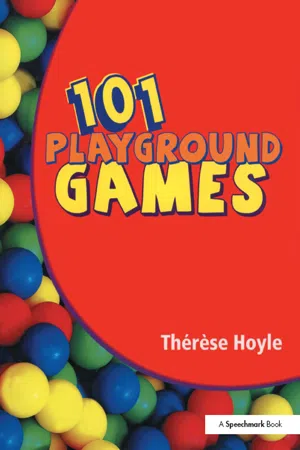
eBook - ePub
101 Playground Games
Enliven and Enrich Any Playtime - A Collection of Active and Engaging Games for Children
This is a test
- 182 pages
- English
- ePUB (mobile friendly)
- Available on iOS & Android
eBook - ePub
101 Playground Games
Enliven and Enrich Any Playtime - A Collection of Active and Engaging Games for Children
Book details
Book preview
Table of contents
Citations
About This Book
The school playground plays a crucial role in developing all aspects of children's behaviour and interpersonal learning. Yet there is a growing awareness that children today do not play in the same sociable ways as previous generations. This resource provides a practical toolkit of ideas to promote lively and enjoyable games. It draws on traditional games and also introduces a wealth of new ones including: *Chasing and catching games *Skipping games and rhymes *Singing and dancing games *Parachute games *Quiet games *Circle games *Cooperative games *Games from around the world.
Frequently asked questions
At the moment all of our mobile-responsive ePub books are available to download via the app. Most of our PDFs are also available to download and we're working on making the final remaining ones downloadable now. Learn more here.
Both plans give you full access to the library and all of Perlego’s features. The only differences are the price and subscription period: With the annual plan you’ll save around 30% compared to 12 months on the monthly plan.
We are an online textbook subscription service, where you can get access to an entire online library for less than the price of a single book per month. With over 1 million books across 1000+ topics, we’ve got you covered! Learn more here.
Look out for the read-aloud symbol on your next book to see if you can listen to it. The read-aloud tool reads text aloud for you, highlighting the text as it is being read. You can pause it, speed it up and slow it down. Learn more here.
Yes, you can access 101 Playground Games by Therese Hoyle, Barbara Maines, George Robinson in PDF and/or ePUB format, as well as other popular books in Education & Education General. We have over one million books available in our catalogue for you to explore.
Information
TRADITIONAL PLAYGROUND GAMES
1. Farmer, Farmer May We Cross Your Golden River?
2. In and Out the Dusty Bluebells
3. What’s the Time Mr Wolf?
4. Grandmother’s Footsteps
5. Fishes in the Sea
6. Duck, Duck, Goose
7. Captain’s Coming
8. Keeper of the Treasure
9. Queelio Cockio
10. Mother May I?

Traditional Playground Games
Play is an essential part of the development of all children and traditional playground games have been played for hundreds of years all over the world.
Once a child reaches school age and begins to play with other children, play becomes a social occasion and games become elaborate rituals.
When playing traditional games children have an incredible capacity to be poetic and creative. In contrast to when they are taught games in PE where the rules are fixed, in the playground they can influence how games are played. You may notice children’s love of rhymes with these old traditional games. I have found that these are often adapted and can exist for the pleasure of themselves and to help children to make sense of the world and reflect cultural fears. I remember the rhyme, ‘My mother said, I never should, play with gypsies in the wood,’ this reflected some of our cultural fears at the time. ‘In and Out the Dusty Blue Bells,’ used to have the ending, ‘You will be my master.’ Most children now say, ‘You will be my partner.’ This reflects the passage of time and possibly political correctness! While listening to children playing you may also have heard some rhymes verging on the taboo!
In the playground children have the freedom to be themselves, unencumbered by the rules and regulations of us adults. There is what the Opies (1969) call a ‘juvenile code’.
When it comes to rules, children often have their own for games or they find ways to make them more co-operative and fair or just more fun!
At Musselburgh School in Dunedin, New Zealand, I recently played the game, ‘Duck, Duck, Goose’. The children had made up some different rules that made the game even better and I have included their ideas in this game. When the goose was caught by the trapper, he reverted to being a duckling and had to squat down in the centre of the inner circle and make duck-like noises and gestures with his arms. This child remained in the centre of the circle until another duck was caught.
Traditional Games in this Section
I have chosen many popular games for this section that children regularly play in the playground. I have also selected some that I loved in my youth.
Game number nine is called ‘Queelio Cockio’, and is often referred to as ‘Queenie’ in other playtime books. This was one of my favourite games when I was ten years old and I have chosen to call it the name that we used to use. You will find that some games do have alternative names and the children may want to re-name or adapt them. Do add their ideas and suggestions when you print off the games from the CD-ROM and please email me new games and any suggestions that make these games even better.
Traditional playground games and games in general have often been handed down from generation to generation. Sadly many of our children cannot play on the streets today, due to parental concerns of stranger danger and busy roads. We hope that you and your schools will now pass on the legacy of our old traditional games to the children you teach.
1. Farmer, Farmer May We Cross Your Golden River?

15 minutes
Age Range: 6–10
Ideal Number of Players: 6+
Equipment Needed: None
How to Play
One player is named the farmer and stands in the middle of a designated area of the playground.
The other players stand behind a line, in a row about ten metres away from the farmer.
A designated ‘home’ area is agreed, usually the opposite end of the play area.
The players call out, ‘Farmer, Farmer may we cross your golden river?’
The farmer replies, ‘Not unless you have the colour... on.’
Those players lucky enough to have that colour on may cross the playground safely to the designated home area.
The farmer then counts to five and on five the other players must walk or run ‘home’ whilst the farmer tries to catch them. Anyone who is caught helps the farmer to choose what colour the players should be wearing next to be able to cross the river.
The game continues with a different colour each time until the last player is caught and she becomes the farmer.
Variations
Once a player is caught they stand in the middle, join hands with the farmer and help him to catch players.
Comments
Make sure all players keep inside the marked area.
2. In and Out the Dusty Bluebells

10–15 minutes
Age Range: 5–7
Ideal Number of Players: 8+
Equipment Needed: None
How to Play
‘In and out the dusty bluebells
In and out the dusty bluebells
In and out the dusty bluebells
Who shall be my partner?
Tippity, tappity on your shoulders
Tippity, tappity on your shoulders
Tippity, tappity on your shoulders
You shall be my partner.’
This is a ring dance for at least eight dancers.
Verse 1
Everyone stands in a circle holding their hands up high to make an arch between each dancer. One dancer is chosen and skips in and out of the arches while all player...
Table of contents
- Cover
- Half Title
- Title Page
- Copyright Page
- Table of Contents
- Using the CD-ROM
- Dedication
- Acknowledgements
- Foreword by Robert Holden
- Introduction
- Why Encourage Children to Play Games?
- How to Use this Book
- 1. Traditional Playground Games
- 2. Tag Games
- 3. Chasing and Catching Games
- 4. Singing and Dancing Games
- 5. Skipping Games and Rhymes
- 6. Circle Games
- 7. Parachute Games
- 8. Quiet Games
- 9. Co-operative Games
- 10. Games from Around the World
- Appendix
- Bibliography
- Resources